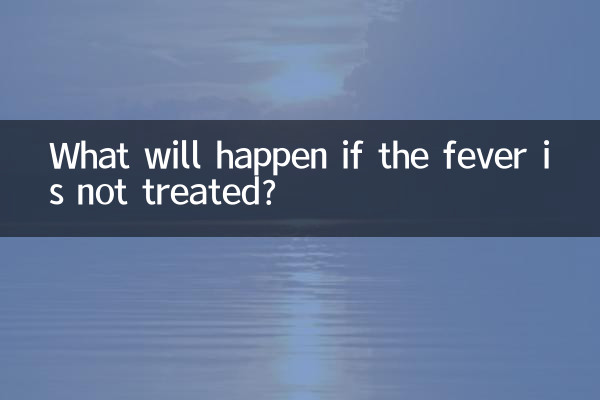What will happen if the fever is not treated?
Fever is a natural response of the body's immune system to fight infection, but if not treated promptly, it can cause a series of health problems. The following are hot topics and content that have been hotly debated across the Internet in the past 10 days. Combined with medical knowledge, we will analyze the potential risks of not treating fevers for you.
1. Potential hazards of not treating fever

| Hazard type | Specific performance | Severity |
|---|---|---|
| febrile convulsions | More common in children, manifesting as convulsions and loss of consciousness | moderate to severe |
| dehydration | Dry mouth, decreased urine output, and decreased skin elasticity | mild to moderate |
| organ damage | Long-term high fever may cause dysfunction of the heart, brain and other organs | Severe |
| spread of infection | Uncontrolled primary infection may lead to serious complications such as sepsis | Severe |
2. Hot topics and discussions related to fever in the past 10 days
1.Misunderstandings about treating children’s fever: Many parents delay fever reduction due to concerns about the side effects of medications, causing their children to suffer from febrile convulsions. Experts recommend timely intervention when the body temperature exceeds 38.5°C.
2.Superinfection of COVID-19 and influenza: Recently, an increase in influenza cases has been reported in many places, and the proportion of fevers has increased after superinfection with COVID-19. If not treated in time, the condition may be aggravated.
3.Shortage of antipyretics: The supply of antipyretics is tight in some areas, triggering discussions on home care for fevers, such as the effectiveness of physical cooling.
3. Correct treatment of fever
| body temperature range | Handling suggestions | Things to note |
|---|---|---|
| 37.3℃-38℃ | Drink plenty of fluids and watch for symptoms | No medication required, just rest |
| 38.1℃-38.9℃ | Physical cooling + appropriate drugs | Avoid alcohol baths |
| ≥39℃ | seek medical attention immediately | Be wary of febrile convulsions |
4. Typical cases of long-term fever that is not treated
1.Case 1: A patient did not seek medical treatment due to a high fever of 39°C that lasted for 3 days, and was eventually diagnosed with suppurative tonsillitis combined with kidney damage.
2.Case 2: A child with a fever of 40°C who failed to cool down in time caused an epileptic seizure. He recovered after first aid, but left neurological sequelae.
5. Fever risks for special groups of people
| crowd | risk level | Special recommendations |
|---|---|---|
| pregnant woman | high | Avoid using ibuprofen |
| elderly | high | Be wary of atypical symptoms |
| Chronic disease patients | extremely high | Seek medical attention if your body temperature is ≥38℃ |
6. Summary
Fever is a warning signal from the body, and if not treated in time, it may develop from a simple infection to serious complications. Based on recent hot discussions and medical data, we particularly emphasize:
1. Adults who have persistent high fever for more than 3 days must seek medical treatment.
2. Children whose body temperature exceeds 38.5°C require medical intervention
3. Special groups should develop personalized response plans
4. When antipyretics are in short supply, physical methods such as warm water bathing can be used first
Timely and correct fever treatment can not only relieve discomfort, but also prevent serious consequences. If you experience critical symptoms such as persistent high fever or changes in consciousness, please go to the emergency room immediately.

check the details

check the details